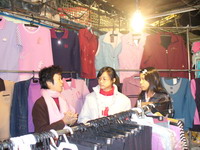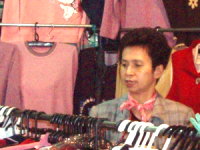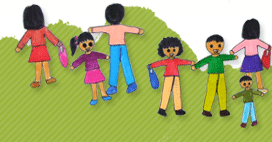    
    
|
Clothes-selling auntie
who takes customized orders
Auntie, named Ms.
Huang, having been selling clothes for more than 20 years, before which she
lived by making clothes. She knew if clothes would be fit, as long as she had a
look at her shape.
|
|
Having learned to
tailor, she couldn’t work anymore because of having a baby after marriage. So
she discussed with her husband and decided to “make some clothes for sale”. She
took the clothes to a factory, earning a little profit at first, but then it
bankrupted without returning her money. She went to the factory, only to find
some cloth, with which she switched to make pretty clothes for children alongwith her husband, as crisis was a turning point.
|

|
|
Then they went to sell them
one set by one set, one hundred by one hundred, near Dinghao. Business became
better, so they sold adult clothes on Wuhsing
Street. It’s only 4 or 5 years since they arrived
in Luchou. Her clothes were bought by cash and unsalable ones could be exchange
with middleman, due to her honesty.
Ms. Huang got up at 5 in the morning, got out at 6:30, and
closed at 2:30 in the afternoon. “She used to use a table to sell clothes without carrying her
purse, but it was gone once when she closed the stall.” Having experienced that
much, she was so clear-headed right now, that she remembered clearly who had
given change to but who hadn’t. Because she could make clothes herself, knowing
which company’s version or material was good, you could be assured to buy
clothes at hers. She would say to customers:” it’s up to you, you can decide if
you deal or not”, in the same way, if it didn’t look good. Ms Huang liked to do
business in Luchou, not because it’s good there, but for its human interest,
kind neighbors, friend-like customers, and some patrons would even visit her on
Tuesday or Wednesday. Comparing those markets together, she found that there
were more foreign customers in Wuhsing
Street, whereas local customers were dominant in Luchou,
so that she could meet some old patrons more frequently, to whom she had more
emotion.” We require strong emotion of our age.” She said. Thus the
relationship between customers and she were not simply money at all. She would
never have an attitude that “you must buy if you have a look at it.”,
contrarily, she would help some customers , who were embarrassed for not buying
but just looking, get through by saying
“It doesn’t matter. You can come here next time, if you cannot find your
favorite this time.” She would figure out a way to let them go naturally,
because she considered it a rule to be a human, whatever profession you had,
you should think of others, which would make your business longer. Having had
an car accident, she rested for almost 3 months, when customers couldn’t find
her. The boss, of the opposite stall, seemed so close that he even told her:”
You didn’t leave me the phone number, otherwise I would see you.” Instead, he
invited her to have some fruits afterwards.
|
|
Ms. Huang had a special way
to treat those tough customers, whom should be taken care of, on account of
best service she had offered. As tough
customers, they would not be welcome at other stalls, who would even make it
hot for them, saying “ Don’t look if you don’t want to buy”,” I wonder you will
buy or not.” and so on, on hearing which, she would have a hard time, but think
of me one day she really wanted to buy some clothes. We have to give
opportunities to those who were very tough.
|

|
|
“How to do business shared the same reason with
how to be a human. Some people cultivated themselves by worshiping Buddha. You
have to face reality patiently, not to worship Buddha necessarily. You were
still a child and probably couldn’t understand it, but you would know how
complicated the society was when you grew up. There were all sorts of people,
who may envy you if you were such a good guy or pick on you if you were bad.
It’s really tough to behave, but it didn’t matter, because toughness required
learning, the younger the faster, till you were old.
His constant belief
was “earnestness”, therefore she lived her life with the aim of serving others,
or you would feel terrible aiming at money. Once, a customer confirmed that she
had bought a coat and given Ms. Huang NT$1,000 without change. Ms. Huang
announced that she didn’t take the money but give the change to her at last,
telling her that” The change was a piece of cake and I gave you, but return it
to me if you found that you still had had NT$1,000.” Believe it or not, the
customer came, gave NT$1,000 back, and apologized, after only one hour. ”Ms.
Huang believed that “it didn’t matter that we were taken advantage of, for we
could eat and sleep as usual, with peace of conscience, exchanging the suffering
for their conscience. Although I suffer a loss offering her clothes, even
money, I felt as ease.”
His constant belief
was “honesty”, therefore she lived her life with the aim of serving others, or
you would feel terrible aiming at money. Once, a customer confirmed that she
had bought a coat and given Ms. Huang NT$1,000 without change. Ms. Huang
announced that she didn’t take the money but give the change to her at last,
telling her that” The change was a piece of cake and I gave you, but return it
to me if you found that you still had had NT$1,000.” Believe it or not, the
customer came, gave NT$1,000 back, and apologized, after only one hour. ”Ms.
Huang believed that “it didn’t matter that we were taken advantage of, for we
could eat and sleep as usual, with peace of conscience, exchanging the suffering
for their conscience. Although I suffer a loss offering her clothes, even
money, I felt as ease.”
Ms. Huang considered
her biggest achievement of this business was that “the clothes she sold were
not only fit but also good-looking”. Some customers left Luchou, but would
still miss her and came back to buy her clothes as well. As a kind woman, she
would ask some old women less money, who didn’t have income yet. So would she
to someone who bought for their mothers-in law or mothers on account of their
filial emotion. The toughest of this business was that rental cost was too
much, and people, who couldn’t easily find a job in the present slack
economical situation, didn’t have spare money to buy clothes, because you were
able to live a life without buying clothes in 5 years, but 3 meals a day was
the most important thing. She learned from this business that there was not
necessarily conflict between human, and you had to be kind, the kinder the
better men you would meet with, while bad ones would keep off.
|
|
|




